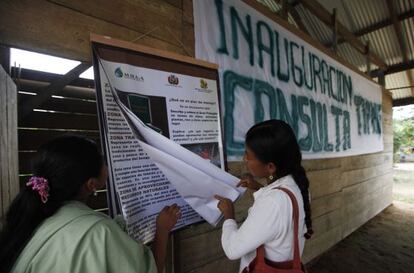Bolivia launches referendum over controversial road
Indigenous communities don’t want highway cutting through the Amazon

Bolivia’s leftist government on Sunday began a more than month-long referendum to allow indigenous communities throughout the country to decide whether they will approve the construction of a controversial highway through a pristine area of the Amazon.
The voting process kicked off in the town of Oromomo, one of the 69 communities that will approve or reject the building of the $420-million highway through the Isiboro Sécure Indigenous Territory and National Park, known as Tipnis.
Oromomo is home to about 70 indigenous families. Surprised by the large presence of the media and government officials, the residents cast their votes in a carnival-like atmosphere.
“The state will respect the decisions and opinions of the residents of the Tipnis,” said Felipe Quispe, the minister for water and environment.
Morales’ support
There has been fierce opposition to the building of the road that could eventually connect Bolivia with Brazil. President Evo Morales, who supports the road, canceled construction plans last September after a violent crackdown put him in a delicate position. Morales, an Aymara Indian, has been a champion of indigenous rights. But in December he changed his mind and announced plans to put the highway to a vote.
For months, Indians have been holding massive marches from the Tipnis to the capital La Paz to protest the road and referendum. They have come under attack by some of Morales’ supporters and others, such as businessmen, who want the construction of the highway to proceed. There are three tribes that live in the Tipinis: the Mojeño-trinitario, Yuracaré and Tsimane.
But the indigenous communities see the Tipnis as ancient ancestral lands, and claim that people are buried there.
“The highway will bring development, and only by building it can we access basic services,” said Jhonny Ervi, the mayor of Oromomo on Sunday.
A La Paz court is hearing arguments by lawyers representing several communities, who are asking for an injunction to stop the referendum from taking place. The vote is expected to continue until late September.
Tu suscripción se está usando en otro dispositivo
¿Quieres añadir otro usuario a tu suscripción?
Si continúas leyendo en este dispositivo, no se podrá leer en el otro.
FlechaTu suscripción se está usando en otro dispositivo y solo puedes acceder a EL PAÍS desde un dispositivo a la vez.
Si quieres compartir tu cuenta, cambia tu suscripción a la modalidad Premium, así podrás añadir otro usuario. Cada uno accederá con su propia cuenta de email, lo que os permitirá personalizar vuestra experiencia en EL PAÍS.
¿Tienes una suscripción de empresa? Accede aquí para contratar más cuentas.
En el caso de no saber quién está usando tu cuenta, te recomendamos cambiar tu contraseña aquí.
Si decides continuar compartiendo tu cuenta, este mensaje se mostrará en tu dispositivo y en el de la otra persona que está usando tu cuenta de forma indefinida, afectando a tu experiencia de lectura. Puedes consultar aquí los términos y condiciones de la suscripción digital.








































